

Epictetus. First published Tue Dec 23, 2008; substantive revision Tue Feb 19, 2013.
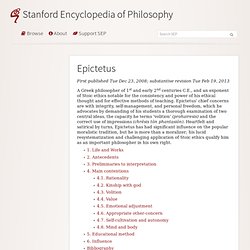
The Enchiridion by Epictetus. Commentary: A few comments have been posted about The Enchiridion.

Download: A 40k text-only version is available for download. The EnchiridionBy Epictetus Written 135 A.C.E. Translated by Elizabeth Carter 1. Some things are in our control and others not. Epictetus, Discourses, book 0, Arrian to Lucius Gellius, with wishes for his happiness. Discourses of Epictetus. The Codex Bodleianus of the Discourses of Epictetus.

Note the large stain on the manuscript which has made this passage (Book 1. 18. 8-11) partially illegible. The Discourses of Epictetus (Greek: Ἐπικτήτου διατριβαί) are a series of extracts of the teachings of the Stoic philosopher Epictetus written down by Arrian c. 108 AD. There were originally eight books, but only four now remain in their entirety, along with a few fragments of the others. In a preface attached to the Discourses, Arrian explains how he came to write them: I neither wrote these Discourses of Epictetus in the way in which a man might write such things; nor did I make them public myself, inasmuch as I declare that I did not even write them.
The Discourses are unlikely to be word-for-word transcriptions and are probably written-up versions of Arrian's lecture notes. Manuscript editions[edit] The Discourses were first printed (in Greek) by Vettore Trincavelli, at Venice in 1535.[10] English translations[edit] Notes[edit] Epictetus Quotes. Epictetus. Philosophy, Epictetus taught, is a way of life and not just a theoretical discipline.
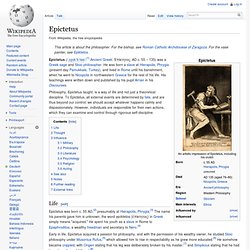
To Epictetus, all external events are determined by fate, and are thus beyond our control; we should accept whatever happens calmly and dispassionately. However, individuals are responsible for their own actions, which they can examine and control through rigorous self-discipline. Life[edit] Epictetus was born c. 55 AD,[2] presumably at Hierapolis, Phrygia.[3] The name his parents gave him is unknown; the word epíktetos (ἐπίκτητος) in Greek simply means "acquired.
" He spent his youth as a slave in Rome to Epaphroditos, a wealthy freedman and secretary to Nero.[4] Roman-era ruins at Nicopolis Epictetus obtained his freedom sometime after Nero's death in 68 AD,[9] and began to teach philosophy in Rome. Thought[edit] No writings of Epictetus himself are really known. Practise then from the start to say to every harsh impression, "You are an impression, and not at all the thing you appear to be.
" Cicero Quotes. Cicero. Marcus Tullius Cicero (/ˈsɪsɨroʊ/; Classical Latin: [maːrkʊs tʊlliʊs ˈkɪkɛroː]; Ancient Greek: Κικέρων Kikerōn; 3 January 106 BC – 7 December 43 BC; sometimes anglicized as Tully[1] /ˈtʌli/), was a Roman philosopher, politician, lawyer, orator, political theorist, consul and constitutionalist.
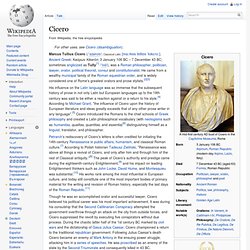
He came from a wealthy municipal family of the Roman equestrian order, and is widely considered one of Rome's greatest orators and prose stylists.[2][3] Petrarch's rediscovery of Cicero's letters is often credited for initiating the 14th-century Renaissance in public affairs, humanism, and classical Roman culture.[7] According to Polish historian Tadeusz Zieliński, "Renaissance was above all things a revival of Cicero, and only after him and through him of the rest of Classical antiquity. Though he was an accomplished orator and successful lawyer, Cicero believed his political career was his most important achievement. Personal life[edit] Early life[edit] Cicero’s case was divided into three parts. Seneca the Younger. Lucius Annaeus Seneca (often known as Seneca the Younger or simply Seneca /ˈsɛnɪkə/; c. 4 BC – AD 65) was a Roman Stoic philosopher, statesman, dramatist, and in one work humorist, of the Silver Age of Latin literature.

He was a tutor and later advisor to emperor Nero. The Meditations of Marcus Aurelius. Stoics Home Page. Stoicism. 1.
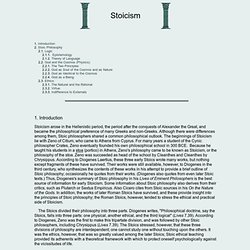
Introduction Stoicism arose in the Hellenistic period, the period after the conquests of Alexander the Great, and became the philosophical preference of many Greeks and non-Greeks. Although there were differences among them, Stoic philosophers shared a common philosophical outlook. The beginnings of Stoicism lie with Zeno of Citium, who came to Athens from Cyprus. For many years a student of the Cynic philosopher Crates, Zeno eventually founded his own philosophical school in 300 BCE. The Stoics divided their philosophy into three parts. 2. Stoic Philosophy. Stoic Philosophy of Mind Stoicism was one of the most important and enduring philosophies to emerge from the Greek and Roman world.
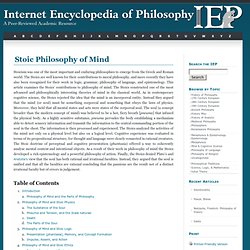
The Stoics are well known for their contributions to moral philosophy, and more recently they have also been recognized for their work in logic, grammar, philosophy of language, and epistemology. This article examines the Stoics’ contributions to philosophy of mind. The Stoics constructed one of the most advanced and philosophically interesting theories of mind in the classical world.
As in contemporary cognitive science, the Stoics rejected the idea that the mind is an incorporeal entity. Instead they argued that the mind (or soul) must be something corporeal and something that obeys the laws of physics. Stoic principles of. A Mind Map of Stoicism. Stoic Practice. The Core Dogmas of Stoicism.
Stoic Home Page.